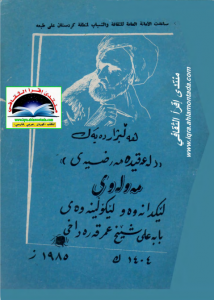Salaam alaykum
I’m a Sunni sister, and I’ve recently come across Sufism and Islamic mysticism. I’m very much interested in learning about Sufism but there are debates on this whole ‘Sunni-Sufi’ thing, I’m confused and I’m trying to ask everyone of their opinion and know if what I’m doing is right or wrong. Could you please share your thoughts on this?
Alaikumassalam wa rahmatullah,
It seems to me the key issue is the sources of knowledge we accept. In mainstream Sunni Islam we accept the Quran and hadith, while in many forms of Sufism a third source of knowledge is added that establishes the doctrine of the allegiance to particular shaykhs and the various spiritual stations that one is said to be able to acquire. These things are not found in the Quran and hadith.
If you are interested in Sufism, there is the mainstream Sunni option of following what we may call paleo-Sufism, the Sufism of its original founders, such as the “father of Sufism” the Persian mystic Junayd of Baghdad. But even such people may bring into Islam ideas that do not have any obvious foundation in the Quran and hadith. So the problem with many forms of Sufism is that it claims to provide knowledge that is separate from the Quran and hadith. For a person dedicated to following pure and original Islam, the introduction of such external systems of knowledge is something to be suspicious of unless given overwhelming proofs.
Personally I don’t have any issue with most kinds of Sufism and there are admirable orthodox scholars who were also Sufis.
I am very interested in spirituality and I believe the right way to deal with Sufism is Imam al-Ghazali’s way, which is to use Sufism instead of accepting Sufism as a third system besides the Quran and hadith. Instead of “becoming Sufi”, you can read Sufi works and adopt whatever beneficial teachings they provide.
I believe Imam al-Ghazali, Ibn al-Jawzi and Ibn al-Qayyim show us what it is like to benefit from Sufism while remaining within mainstream Sunni Islam. It’s similar to benefiting from philosophy and logic. Imam al-Ghazali’s great achievement was that rather than becoming a typical philosopher (like Ibn Sina / Avicenna), he used philosophy and brought it into mainstream Islam while maintaining the Quran and hadith as supreme. He did the same with Sufism, bringing it into mainstream Islam without becoming a typical Sufi seeker or shaykh.
So there are two ways to use or practice Sufism. Either one accepts it as a third system besides the Quran and hadith, “becomes Sufi”, and gives allegiance to particular Sufi orders, systems or teachers, or one treats Sufism like any other field of knowledge, benefiting from it while maintaining allegiance to the Quran and hadith. The second route is the only possible one for me personally because as a very logic-minded and skeptical person, I cannot accept Sufi systems due to their lack of obvious and unchallenged foundation in the Quran, hadith or common sense. The various Sufi saints may have great things to teach me, but it is wholly against my nature to submit to them as a disciple. I can only view them as superior colleagues who have useful things to teach me, similar to the way I view any Islamic scholar, or any secular philosopher, thinker or scientist.
I have no issue with people reading Sufi works, or even non-Muslim works of spirituality and mysticism. As long as a person does not submit to systems, authorities and individuals outside the Quran and the Prophet’s guidance PBUH, then they can safely benefit from things like Sufism without leaving the mainstream and becoming something else. As long as you constantly read the Quran and try sincerely to submit to no authority other than it and the Prophet PBUH, then even if you are unconsciously influenced by Sufism or secular thought, you will always be brought back to the right track inshaAllah. I have been reading the complete works of the great Christian thinker C. S. Lewis and despite the fact that I admire him and see much beauty in his kind of Christianity, my reading has only helped me to see Islam’s beauty and superiority more clearly. If Islam is truly God’s final and perfect message, and if we always sincerely go back to it, then no amount of reading and learning will make us abandon it, because as knowledge and understanding increases, our appreciation for God’s teachings will also increase, if Islam is really true (which I believe).
You may be interested in my books The Sayings of Ibn al-Jawzi (free version) and the The Sayings of Ibn Qayyim al-Jawziyya (free version), which show us the thinking of two spiritual practitioners who benefited from Sufism without becoming Sufi. Imam al-Ghazali is also very much worth reading. He’s often categorized as a Sufi, but it’s clear from his works that he used Sufism rather than accepting it as a third system. He used Sufism just as he used philosophy and Greek logic.
Best wishes.
